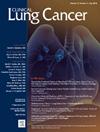FLAIR: A Phase II, Open Label, Randomized Study of Osimertinib Plus Bevacizumab Versus Osimertinib in Recurrent or Metastatic Treatment-Naïve NSCLC Patients Harboring EGFR 21L858R Mutation
IF 3.3
3区 医学
Q2 ONCOLOGY
引用次数: 0
Abstract
Introduction
Osimertinib, the 3rd generation EGFR-TKI, has emerged as standard first-line treatment for patients with advanced EGFR mutated nonsmall cell lung cancer (NSCLC). Patients with exon 21 L858R mutation showed lower efficacy with EGFR-TKIs than those with 19Del mutation, even with osimertinib, it remains an unmet medical need to further improve the efficacy in L858R population. We present the rationale and design for FLAIR (NCT04988607), which will investigate the efficacy and safety of osimertinib plus bevacizumab versus osimertinib monotherapy in treatment-naïve recurrent or metastatic NSCLC patients harboring EGFR exon 21 L858R mutation.
Materials and Methods
FLAIR is a prospective, multicenter, randomized, open label study, which is initiated by Chinese Thoracic Oncology Group (CTONG2002). Patients age ≥18 years with primary recurrent or metastatic nonsquamous NSCLC who are treatment-naïve with documented EGFR exon 21 L858R mutation is eligible. Patients will be randomized 1:1 to receive osimertinib 80 mg once daily plus bevacizumab 15mg/kg every 3 weeks or osimertinib monotherapy 80 mg once daily until progression or another discontinuation criterion is met. The primary endpoint is investigator-assessed progression free survival (PFS). Secondary endpoints include: overall survival rate at 24 months, time to treatment failure (TTF), overall response rate (ORR), disease control rate (DCR), duration of response (DoR), central nervous system (CNS) PFS, CNS ORR and safety.
Results
FLAIR has completed the enrollment, and results are expected in the fourth quarter of 2025 (depending on the actual event rate).
Conclusions
This study will offer better perspectives on the efficacy and safety of osimertinib plus bevacizumab combination therapy in treatment-naïve recurrent or metastatic NSCLC patients harboring EGFR exon 21 L858R mutation, providing valuable guidance for clinical practice.
FLAIR:针对携带表皮生长因子受体 21L858R 基因突变的复发性或转移性治疗无效 NSCLC 患者的奥希替尼加贝伐珠单抗与奥希替尼的 II 期开放标签随机研究。
简介奥希替尼是第三代表皮生长因子受体抑制剂(EGFR)-TKI,已成为表皮生长因子受体(EGFR)突变的晚期非小细胞肺癌(NSCLC)患者的标准一线治疗药物。外显子21 L858R突变患者使用EGFR-TKIs的疗效低于19Del突变患者,即使使用奥希替尼,进一步提高L858R人群的疗效仍是未满足的医疗需求。我们介绍了FLAIR(NCT04988607)的原理和设计,该研究将调查奥希替尼联合贝伐珠单抗与奥希替尼单药治疗携带表皮生长因子受体外显子21 L858R突变、治疗无效的复发性或转移性NSCLC患者的疗效和安全性:FLAIR是由中国胸科肿瘤学组(CTONG2002)发起的一项前瞻性、多中心、随机、开放标签研究。年龄≥18岁的原发性复发或转移性非鳞状NSCLC患者,治疗无效且有EGFR 21外显子L858R突变记录者均可参加。患者将按照1:1的比例随机接受奥希替尼80毫克,每天一次,外加贝伐珠单抗15毫克/千克,每3周一次;或奥希替尼单药治疗,80毫克,每天一次,直至病情进展或达到其他停药标准。主要终点是研究者评估的无进展生存期(PFS)。次要终点包括:24个月总生存率、治疗失败时间(TTF)、总反应率(ORR)、疾病控制率(DCR)、反应持续时间(DoR)、中枢神经系统(CNS)PFS、中枢神经系统ORR和安全性:FLAIR已完成注册,预计将于2025年第四季度出结果(取决于实际事件发生率):该研究将为奥西替尼加贝伐珠单抗联合治疗携带表皮生长因子受体外显子21 L858R突变的治疗无效复发或转移性NSCLC患者的疗效和安全性提供更好的视角,为临床实践提供有价值的指导。
本文章由计算机程序翻译,如有差异,请以英文原文为准。
求助全文
约1分钟内获得全文
求助全文
来源期刊

Clinical lung cancer
医学-肿瘤学
CiteScore
7.00
自引率
2.80%
发文量
159
审稿时长
24 days
期刊介绍:
Clinical Lung Cancer is a peer-reviewed bimonthly journal that publishes original articles describing various aspects of clinical and translational research of lung cancer. Clinical Lung Cancer is devoted to articles on detection, diagnosis, prevention, and treatment of lung cancer. The main emphasis is on recent scientific developments in all areas related to lung cancer. Specific areas of interest include clinical research and mechanistic approaches; drug sensitivity and resistance; gene and antisense therapy; pathology, markers, and prognostic indicators; chemoprevention strategies; multimodality therapy; and integration of various approaches.
 求助内容:
求助内容: 应助结果提醒方式:
应助结果提醒方式:


